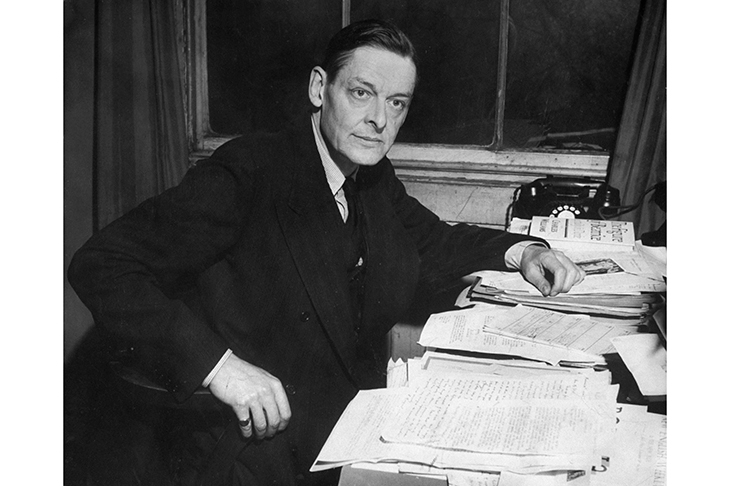Like many a 20th-century publishing house, the fine old firm of Faber & Faber came about almost by accident. The inaugurating Faber — Geoffrey — was an All Souls don in search of a livelihood, who began his career in the post-Great War book trade by investing in the Scientific Press, publishers of the Nursing Mirror. There was trouble with the Gwyer family, owners of the original concern, who resisted the move into general books and disliked the poems of Faber’s brisk young protégé Mr Eliot, but by 1929 the sale of the Mirror for an eye-watering £190,000 (about £5 million at current values), allowed Geoffrey to buy them out and set up on his own.
None of this was accomplished without a struggle, and Toby Faber, the founder’s grandson, quotes some particularly gloomy diary entries from the Gwyer days (‘I feel life is not worth living: the business seems to present insuperable obstacles’.) There were also nervous elders to placate. An exasperated letter from Geoffrey to his mother in February 1929 runs:
Here are you and Dorothy getting back your original investment thricefold, myself paying off the whole of my loan, becoming master of my own business, with some £20,000 over into the bargain; & all you can do is to write a letter which anyone would suppose to refer to a terrible financial calamity.
Was there ever a good time to start a publishing firm? Most publishers’ memoirs from the pre-conglomerate days are framed in an atmosphere of well-nigh Dickensian gloom, where whey-faced clerks fret over the profit-and-loss account while creditors’ boots trample on each unguarded stair. Happily, Fabers had a trump card in the shape of Geoffrey’s co-director, T.S. Eliot. Eliot’s reputation as a poet, his prestige as a critic and his editorship of the small-circulation but stratospherically highbrow (and Faber-sponsored) Criterion gave the firm a mystique that lasted for several decades; and as late as the 1960s Seamus Heaney could remark that a summons to attend the office at Russell Square was ‘like getting a letter from God the Father’.
Eliot, naturally, occupies centre-stage in young master Toby’s 90th anniversary celebration, and not merely for his husbandry of a poetry list that included Spender, Auden, Larkin and Hughes: it was the royalties from Cats, after all, that enabled an always precariously financed firm to survive into the 21st century. And so we have a late-period Eliot puzzling himself over George Steiner (‘this extraordinary American who cannot write English and whose style is one of vulgar vehemence’) and a mid-period Eliot calmly rejecting Animal Farm — although you wish Toby had kept his nerve and included the really incriminating part of the letter in which Orwell is informed that ‘your pigs are far more intelligent than the other animals and therefore the best qualified to run the farm…’
Alive to the fact that most publishing commemoratives are dull to the point of stupefaction, Toby Faber has taken the oral history route, constructing a narrative out of correspondence and diary entries, with his own interpolations primed to supply context. Attractive though this is, the book is an odd undertaking. The last 40 years rip by in a scant 40 pages, and great as the fanfare that subsequently attended authors such as Kazuo Ishiguro and Paul Auster, there is a limit to the enjoyment that can be got out of letters from editorial sponsors of their early work that routinely begin with bromides about enjoying the first five chapters and hoping to make more detailed comments on their return from the Frankfurt Book Fair.
Still, what follows is, for an official history, agreeably even-handed, balancing Booker Prize triumphs with the corking row between editorial director Robert McCrum and novelist Maggie Gee in the late 1980s that led to McCrum confessing that ‘I feel you do not trust me and that you have lost confidence in all of us’. Meanwhile, Professor John Carey, a staple of the firm’s list since the early 1970s, will doubtless be delighted to learn that a Faber employee called Frank Pike reckoned him ‘a very intelligent and perceptive if slightly arrogant and impatient man’.
And then, as in all publishing histories, there are the books that failed to capture the public’s heart, or, worse, were never published at all. Pride of place in the latter category goes to The Glass House, a rejected submission from 1941, which according to Geoffrey
assumes the war is over and has been won by the Allies, and Hitler and his gang are deprived of their clothes and imprisoned naked in a glass house in Berlin. The result of which is that the Germans cease to regard them with veneration.






Comments